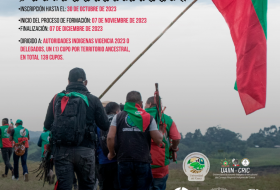News
Unicauca and UAIIN – CRIC in alliance to understand public fiscal control with an indigenous territorial focus.
The two institutions will hold an academic event from November 7th to December 7th, where they will address the progress and challenges that have arisen from the issuance and implementation of norms granting autonomy to indigenous authorities in managing the special resources of the General System of Allocations.
The Universidad Autónoma Indígena Intercultural UAIIN - CRIC and the Universidad del Cauca, within the academic research framework of the Doctorate in Ethnobiology and Biocultural Studies, are organizing a Diploma course on Public Fiscal Control with an Indigenous Territorial Focus. This course will take place from November 7th to December 7th, 2023.
The academic event, targeting indigenous authorities for the year 2023, will be guided by the candidate for a Doctorate in Ethnobiology and Biocultural Studies, Gerardo Eliud López Vargas.
The acknowledgment claimed through the signing of the International Covenant on Civil and Political Rights, the American Convention on Human Rights, ILO Convention 169, and the United Nations Declaration on the Rights of Indigenous Peoples had a direct impact on the 1991 Colombian Constitution. This established the autonomy of indigenous peoples, allowing them to be governed by their own authorities, benefit from resources of the General System of Allocations, hold their own jurisdiction, enjoy ethnic education, among other rights.
"In this academic effort, we aim to question the reality concerning the progress and challenges arising from the issuance and particularly the application of norms that establish or grant autonomy to indigenous authorities in managing the special resources of the General System of Allocations," adds Professor Gerardo Eliud López Vargas.
Likewise, he emphasizes that within this context, it is considered necessary for indigenous authorities to understand the implications and logics in handling the resources of the SGP, managed through territorial entities, as well as the direct mechanisms related to certified reserves for this purpose.
"It is crucial to recognize the importance for judicial, disciplinary, and fiscal authorities, within their competencies in analyzing the responsibility of indigenous authorities in managing the special resources of the General System of Allocations, to observe and apply an ethnic and differential approach in their mission through an understanding of the indigenous worldview," he concludes.


